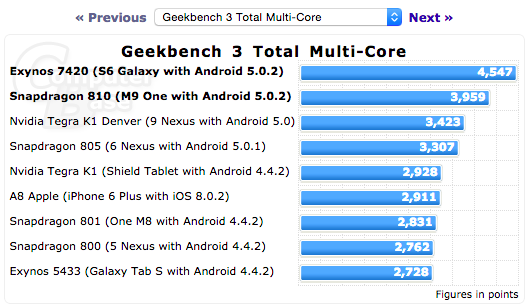Wow, Samsung is manufacturing 10nm already?
Of course, no company has started mass manufacturing 10nm yet.
The PhoneArena article is a bit confusing. First it says that it will take Samsung 2 years to get the machinery to be able to mass manufacture 10nm. But then it says the Samsung Galaxy S7 and the iPhone 6S will have 10nm FinFET chips. Perhaps a bit of inconsistency in the article?
Anyway, with all things, we will believe it when we see it. I just hope that Samsung will remove all its bloatware from its smartphones. I'm just sick and tired of Samsung not fixing the software side of things... I seriously hope they get it right with the SGS6. I mean 14nm Exynos 7420 Octa Core is great news, but if their software still lags then that would be rather disappointing. I guess we'll see in a matter of days.
But for now, Samsung seems to be slightly ahead of Intel and years ahead of TSMC/Qualcomm.
In other words it's Samsung > Intel >>>>>>> TSMC/Qualcomm. The technological gap between Samsung and Intel is not much, whereas the gap between Samsung and TSMC/Qualcomm is huge.
http://www.phonearena.com/news/Skip...om-14nm-straight-to-10nm-mobile-chips_id66346
http://blog.gsmarena.com/samsung-demoes-first-10nm-finfet-chip-ahead-intel/
Of course, no company has started mass manufacturing 10nm yet.
The PhoneArena article is a bit confusing. First it says that it will take Samsung 2 years to get the machinery to be able to mass manufacture 10nm. But then it says the Samsung Galaxy S7 and the iPhone 6S will have 10nm FinFET chips. Perhaps a bit of inconsistency in the article?
Anyway, with all things, we will believe it when we see it. I just hope that Samsung will remove all its bloatware from its smartphones. I'm just sick and tired of Samsung not fixing the software side of things... I seriously hope they get it right with the SGS6. I mean 14nm Exynos 7420 Octa Core is great news, but if their software still lags then that would be rather disappointing. I guess we'll see in a matter of days.
But for now, Samsung seems to be slightly ahead of Intel and years ahead of TSMC/Qualcomm.
In other words it's Samsung > Intel >>>>>>> TSMC/Qualcomm. The technological gap between Samsung and Intel is not much, whereas the gap between Samsung and TSMC/Qualcomm is huge.
http://www.phonearena.com/news/Skip...om-14nm-straight-to-10nm-mobile-chips_id66346
Skipping stairs - Samsung goes from 14nm straight to 10nm mobile chips!
http://blog.gsmarena.com/samsung-demoes-first-10nm-finfet-chip-ahead-intel/
Samsung demoes first 10nm FinFET chip ahead of Intel
Samsung scooped Intel and demoed the first 10nm FinFET chip in the world. The company had previously made eMMC storage and D-RAM chips at that node, but FinFET is the first step towards a 10nm Exynos chipset.

Samsung is already at 14nm and will be making the Galaxy S6-generation Exynos chipsets at that node, along with Apple’s new chipset. Qualcomm meanwhile is building the Snapdragon 810 on the older 20nm process.
Samsung envisions its 10nm chips to power more than smartphones, there are plans to put them in data centers and power the Internet of Things. The new chips will be more power efficient and produce less heat, vital for phones and other battery-powered devices (say, smartwatches).
Intel is on its way to 10nm too and has said it expects the first chips in 2016. We’ll see if Samsung beats the old giant to the punch as having the better manufacturing process has been a traditional advantage for Intel.
Last edited:
![[H]ard|Forum](/styles/hardforum/xenforo/logo_dark.png)

